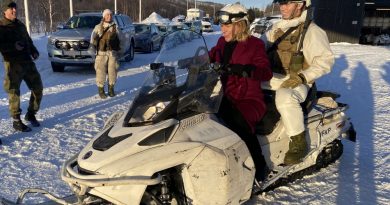Alaska: Lawsuit claims Chukchi rules fail to protect walrus

A coalition of environmental groups have filed a lawsuit against the Fish and Wildlife Service, saying its rule allowing the oil industry to disturb or harm Pacific walrus in the Chukchi Sea violates the Marine Mammal Protection Act.
Earthjustice attorney Erik Grafe says the rule the Fish and Wildlife Service issued last year isn’t specific enough to protect walrus from seismic work, oil drilling and other industry activity in the Chukchi Sea.
“Instead the rule defers analysis of the impact of oil and gas activities at the Hanna Shoal and mitigation of those effects to a later stage that is not subject to public comment and that the people don’t get to know about until after the fact,” he said.
The waters governed by the rule, off Alaska’s northwest shore, include an area where Shell has leases and may resume exploration as early as next year. The Fish and Wildlife Service determined industrial activity would harm only a small number of walrus. The rules require aircraft to stay away from the animals and limits seismic noise when walrus are present.
Faulty protections or frivolous litigation?
Grafe says walrus are already suffering from a massive loss of sea ice that used to allow them to rest closer to their foraging grounds. Now, Grafe says, they congregate on land in summer and travel to productive areas like the Hanna Shoal, a 30-mile shallow shelf that’s near Shell’s Burger Prospect.
“So what they’re having to do is swim all the way from those coastal haul outs, all the way out to the Hanna Shoal to feed and then swim all the way back,” Grafe says. “And this is mothers and calves and it’s a huge burden on them and a huge stress, and allowing activities in the Hanna Shoal without analyzing those impacts just adds to walruses’ woes.”
Kara Moriarity, president of the Alaska Oil and Gas Association, says walrus are already protected by law. She says the Fish and Wildlife service rule includes flexibility so companies can meet protection standards using the latest technology. Moriarity says her group is still studying the suit.
“It appears, at first blush anyway, this could just be another attempt to delay progress through frivolous litigation, because we’ve certainly seen our fair share of that,” she said.
Earthjustice filed the lawsuit in U.S. District Court in Washington, D.C. on behalf of the Alaska Wilderness League, Greenpeace and four other environmental groups.
Related stories from around the North:
Canada: Nunavut hunters seeing fewer ringed seals in Canada’s eastern Arctic, CBC News
Finland: Building dens for Finland’s Saimaa seals, Yle News
Iceland: Endangered whale meat shipped from Iceland via Halifax, The Canadian Press
Norway: Rapid growth in Svalbard walrus population, Barents Observer
Sweden: Rare dolphin spotted on Sweden’s west coast, Radio Sweden
United States: Biologists spot huge gathering of walruses in Arctic Alaska, Alaska Dispatch



